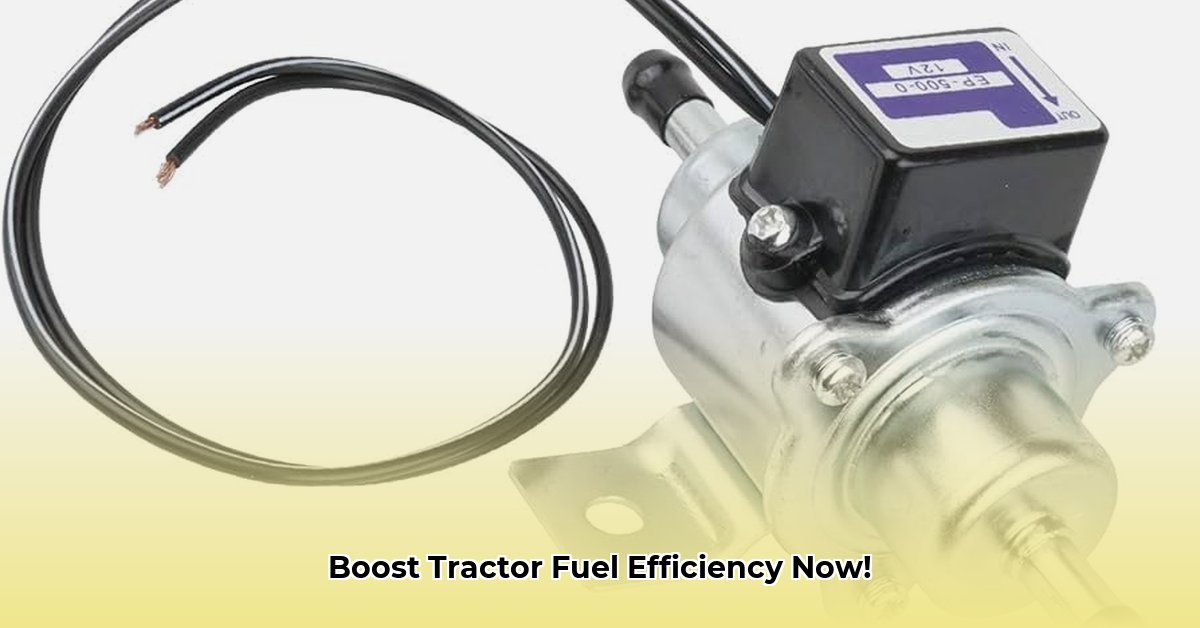
Farming demands efficiency. Fuel costs significantly impact profitability and environmental sustainability. A well-maintained 12-volt fuel pump is a cornerstone of efficient tractor operation, directly impacting your bottom line and environmental footprint. This guide provides actionable steps to maintain and troubleshoot your fuel pump, ultimately boosting fuel efficiency and contributing to sustainable farming practices. For additional tractor maintenance tips, check out our helpful guide.
Understanding Your Tractor's Fuel System
Your tractor's 12-volt fuel pump is the heart of its fuel delivery system. It draws fuel from the tank and delivers it under pressure to the engine. Consistent, adequate pressure is vital for optimal engine performance and fuel economy. Insufficient pressure can lead to poor performance, increased fuel consumption, and costly downtime. Think of it as the circulatory system of your tractor – a disruption anywhere within it affects the whole machine.
Recognizing Warning Signs: Common Fuel Pump Problems
Several symptoms indicate potential issues with your fuel pump. Early detection avoids larger, more expensive repairs.
- Noisy Operation: A humming, whining, or clicking sound from the pump suggests wear and tear. This might be fixable with a simple tightening, but persistent noise usually signals impending failure.
- Sluggish Performance: If your tractor struggles to accelerate, maintain speed on inclines, or frequently stalls, low fuel pressure could be to blame. While a clogged fuel filter is often a primary culprit (check that first!), a failing pump is a strong possibility.
- Complete Pump Failure: A complete failure results in a non-starting tractor. Rule out other causes (fuel filter, battery) first before suspecting the pump.
Maintaining Your Fuel Pump: A Step-by-Step Guide
Regular maintenance and proactive repairs significantly extend the lifespan of your fuel pump and improve fuel efficiency. A small investment of time regularly greatly reduces the likelihood of larger expenses later.
- Visual Inspection (Monthly): Inspect fuel lines, hoses, and connections for cracks, leaks, or loose clamps. Tighten anything loose. This preventative measure helps avoid costly leaks and failures.
- Fuel Filter Replacement: This is vital. A clogged filter restricts fuel flow, stressing the pump and reducing efficiency. Replace your fuel filter according to the manufacturer's recommendations. How much money do you save by preventing pump damage with a simple and cheap fuel filter change? A lot!
- Pump Replacement (When Needed): Replacing a 12-volt fuel pump involves disconnecting electrical connectors and fuel lines. Consult your tractor’s manual for specific instructions. If uncomfortable with this, seek a qualified mechanic. Remember this is a straightforward task for many, but improper installation can lead to further engine damage and cost you more money.
Selecting the Right Replacement Pump
Choosing the correct replacement pump is critical. An incompatible pump can damage your engine, leading to costly repairs. Always consult your tractor's owner's manual or contact your local Tractor Supply store for assistance in determining the best fit for your model.
"Choosing the correct pump ensures optimal fuel efficiency; using the wrong one can lead to significant engine problems," advises Dr. Emily Carter, Agricultural Engineering Professor at Purdue University.
Best Practices for Maximum Fuel Efficiency
Fuel efficiency extends beyond the pump itself. Implementing these practices enhances overall fuel economy.
- Regular Maintenance: Scheduled maintenance keeps your tractor operating at peak efficiency, minimizing fuel waste.
- Proper Tire Inflation: Maintain recommended tire pressure to reduce rolling resistance and improve fuel economy. Under-inflation can significantly increase fuel consumption.
- Precision Agriculture: GPS-guided systems and other precision technology minimize overlaps and wasted fuel. Precision farming is a valuable investment that pays dividends in reduced fuel expenses.
- Efficient Operation: Avoid harsh acceleration and braking patterns. Maintain an optimal speed for the task at hand. "Smooth operation significantly increases fuel efficiency," states John Miller, a seasoned farmer with 30 years of experience.
Conclusion: Sustainable Farming Through Fuel Efficiency
A well-maintained 12-volt fuel pump and best practices for fuel efficiency provide multiple benefits: reduced fuel costs, enhanced sustainability, and improved equipment longevity. Preventative maintenance is a cost-effective strategy for maximizing the lifespan and fuel performance of your tractor. Prioritizing fuel efficiency is not just fiscally responsible but also contributes to environmentally conscientious farming.